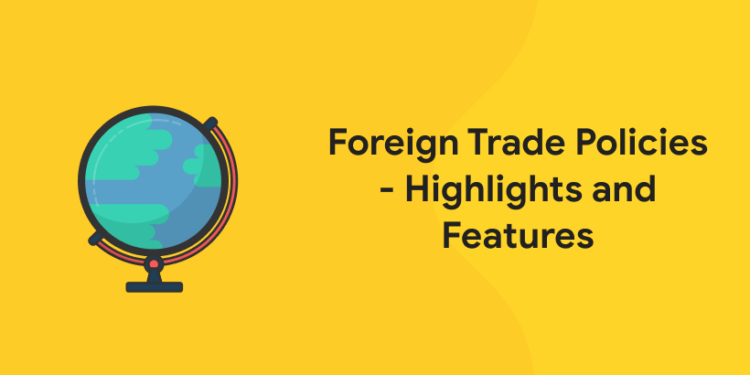Table of Contents
Foreign Trade Policy is a set of guidelines and instructions established by the DGFT (Directorate General of Foreign Trade) in matters related to the import and export of goods and services in India. The Government of India, Ministry of Commerce and Industry announces Export Import Policy (EXIM) every five years. It is updated every year on the 31st of March, and the modifications, improvements, and new schemes become effective from 1st April. It is regulated by foreign trade (development and regulation), Act 1992. The central government also has the power to make provisions relating to imports and exports as per section 3 of the Act.
Attempt Free General Knowledge Quiz! Register Here!
Foreign Trade Policy
The Foreign Trade Policy (FTP) was introduced by the Government to help develop the Indian export of goods and services, generating employment and increasing value addition in the country. It plays a significant role in the national economic development. The Government, through the implementation of the policy, seeks to develop the manufacturing and service sectors.
The trade policies regulate the import and export of the country and restrict the unregulated economy to protect the interest of consumers in the domestic market and have healthy competition with the international market.
The Government, through the policy, primarily focuses on adopting a twin strategy of promoting traditional and sunrise sectors of exports including services. Further, it intends to simplify the process of doing business.
Highlights of Foreign Trade Policy
1: Who was the first woman President of India?
- This act has empowered the central government to formulate and announce the export and import policy.
- The government is also empowered to restrict, regulate and prohibit import and export in cases of foreign trade.
- This act provides the director-general of foreign trade appointment to advise the central government on formulating the FTP.
- The policy facilitates hassle-free transactions for both import and export.
- It aims to allow the import of certain goods as listed in the Open General License; a kind of export license which is issued by the Government to domestic suppliers.
- The objectives of this act include facilitation of distribution of goods and services to the domestic consumer at good quality with internationally competitive prices, sustainable economic growth, enhancement of efficiency of agricultural and technological industry in India.
- It aims at accelerating the economy from low-level economic activities to high-level economic activities by making it a globally oriented and vibrant economy.
- It encourages stakeholders to strive for international standards of quality
- It provides quality consumer products at reasonable prices
Attempt Free General Knowledge Quiz! Register Here!
Features of Foreign Trade Policy 2021-26
- This new policy aims to facilitate both the import and exports market, unlike the previous FTP.
- It aims to provide digitalization of the whole EXIM process.
- This policy lays the importance of easy access to credits to MSME’s which lack collateral.
- Focus on lower import duty and tax rates on goods imported in India or on raw materials.
- The government has introduced the Remission of Duties or Taxes on Export Products (RoDETP) to meet WTO compliant tax benefits. The RoDTEP replaced the Merchandise exports from India (MEIS) scheme.
- Improvise the infrastructure of domestic services and small sectors and regulate the trade imbalance in India.
India aspires to be a $5-trillion economy by 2025. To achieve this dream, it needs to:
- Register a GDP growth rate of 8% or more in the next few years
- Triple its exports to $1 trillion by 2025
Attempt Free Mock Tests for General Knowledge! Download Entri App!
Evolution of Foreign Trade Policy
Since the implementation of the Act in 1992, it has evolved continuously. The Act was introduced on 1st April, 1992, and was valid up to 31st March 1997. The Act helped to liberalize imports, uplift exports, and stabilize trade. The policy substantially liberated the imports and exports of all the goods and services without too many restrictions.
The EXIM policy of 1997 to 2002 eliminated the feature of licensing of goods, quantitative restrictions, and other controls. It also introduced the new Duty entitlement passbook scheme(DEPB). Under the duty entitlement passbook scheme (DEPB), an exporter may get the number of duties he incurred on export returned to him in the form of credit.
The EXIM policy of 2004 to 2009 aimed to strengthen SEZ schemes by granting them permission to set up offshore units to procure short-term commercial borrowings and limit commodity price risks. It also removed quantitative export restrictions on agricultural products except for a few products. The policy provided incentive schemes for cottage industry exemption from maintaining export obligation under the EPCG scheme.
The policy of 2009 to 2014 aimed at improving export potential, boosting foreign trade, earning valuable foreign exchange. It also announced schemes like Focus product schemes (FLP), Market linked focus product scheme (MLFPS), and Focus market scheme(FMS).
The policy of 2015 to 2022 was mainly aimed at declining arrest of exports during the previous policy regime. It introduced a new scheme, “merchandise exports from Indian scheme (MEIS)” and “Services exports from India scheme (SEIS)”. The ‘Services Exports from India Scheme’ (SEIS) is for increasing exports of notified services. The MEIS scheme provides rewards to exporters to offset infrastructural inefficiencies and associated costs.
Attempt Free Mock Tests for General Knowledge! Download Entri App!
Initiatives Under the Foreign Trade Policy
Some of the major initiatives under the Foreign Trade Policy are:
- Niryat Bandhu Scheme
- Electronic Bank Certificate (e-BRC)
- Electronic Import Exporter Code
- Online Inter-Ministerial Consultation
- Electronic Data Interchange (EDI)
- Single Window Interface
The implementation of EXIM policy or foreign trade policy in India has helped in the country’s economic development. The foreign trade policy also increased healthy competition between domestic traders and the international market, which led to diversified market development for consumers and manufacturers in India. India’s foreign trade policy is expected to improve the performance of the Indian manufacturing industry, and the trading system. This will help us to compete in the international market thus leading to an increase in foreign exchange and flow of capital in our country through foreign direct investment. It also assists in raising the standard of living and making commodities available at a lower cost. The policy will enhance the position of India in the international market and create benefits for all.
The key point to clear an exam lies in methodical and planned preparation. If you are a candidate who wants to pursue your dream career and looking for a good start, Entri App has got it covered for you. Entri App provides a great online platform for all those aspiring to appear for various bank exams, government exams and other competitive exams. Our team of experts provide short and precise video classes which helps in learning the concepts. Users get access to flash cards and quizzes and can attempt unlimited mock exams with the same pattern as that of the real exams. We also provide PDFs of previous years’ question papers with solutions.













